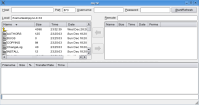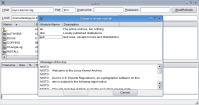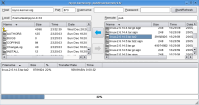 |
 |
 |
 |
 |
QSync 0.3 released! (2005-12-28)Download from the SourceForge project page or from this page. I don't have time to add anything meaningful here right now, so I'll just put some screenshots here and paste in the README file for now. Please see the README for installation instructions! Screenshots taken on Slackware 10.2/KDE 3.4.2, with KDE's default "Plastik" style. 


QSync 0.3 (2005/12/28) INTRO ======== This is the second public release of QSync (0.3). The GUI is looking better, and there are many fewer bugs than before, but downloading through rsync (which is what most people will use QSync for) works very well. This version does not depend on the system rsync binary at all - it uses a built-in version of rsync. So, what doesn't work? The syncing portion of QSync isn't quite right yet. When downloading files that already exist in up-to-date form on the client side, the rsync operation will complete successfully, but the progress info will not be updated for said files. This is a feature that will be implemented in subsequent versions of QSync. Uploading files will also come in later versions, as I'm guessing most people are less likely to use this feature. Questions? Comments? amrit@transamrit.net. INSTALL ========= Semi-standard procedure: (cd src/rsync; ./configure); ./configure; make; make install Why the additional configure step? This version of qsync uses the rsync code exactly as it is included in the rsync source distribution, and qsync's configure script doesn't yet know how to recurse into the rsync source directory. The created Makefile, however, is smart enough to build in one step. A fixed configure step will come later. For now, I'm making qsync more usable. RUNNING ========= Simply run 'qsync' after installing. It is best to run it from a terminal, as there are not many (any?) errors reported in the GUI yet. Most (all?) will be spit out into the terminal. The minimum required info for successful operation is the Hostname (of the rsync server you want to connect to). If the rsync module you want to connect to is publically listed on the server, QSync will notice this and allow you to choose among all listed modules. If you know that it is not listed, you need to enter the module name in the Remote Path field. If the module will require a username and password, enter it in the appropriate fields before clicking the "Start" button. Various functions that used to show up in the old QSync GUI have been removed, as they were unimplemented anyway, and are currently unnecessary. BUGS ====== As I said, there are plenty of bugs. As usual, though, I've tried to get rid of all of the showstoppers before putting out this release. Currently uploading is not implemented, and there are problems with showing progress info when files already exist in up-to-date form on the local side. Also, 'make uninstall' probably will not remove images installed in $PREFIX/share/pixmaps/qsync. This is because I don't quite know what I'm doing with auto*, but at some point I'll figure it all out and fix this. HISTORY ============= (From 2005-01-07) If you look at the SourceForge project page (http://sf.net/projects/qsync/), you'll notice that QSync is over 2 years old now, yet hasn't had a public release until now. This is because this project started off as something to just keep my C++ skills from deteriorating further than they already had. This meant that I worked on it about 3 days out of every 3 months, and I had no idea what I was working on the last time I did anything. This explains the various "WTF?"s sprinkled around the source. It also explains some of the ugliness and incoherence of the code. I also had realized that frontend to simplify rsync usage could be very useful, and during its [long] development, others have remarked the same. So, qsync is finally here, and the masses may rejoice. I think. FEEDBACK ========== All questions/comments/flames/etc can be directed to amrit@transamrit.net. | ||